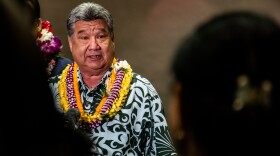Hawai’i’s infrastructure received its first report card and more than half of grades were below passing.

The local chapter of the American Society of Civil Engineers gave the state's infrastructure an overall grade point average of D-plus.
“The 2019 Repot Card covers 11 infrastructure categories," said Civil Engineer Steven Doo, report card committee co-chair. “And of those categories, 5 are in mediocre condition and six are in poor condition or already at risk.
"Overall, Hawai’i’s infrastructure is in poor to fair condition and most of the state’s infrastructure has been operating beyond it’s useful life, with some components over one hundred years old.”

Storm-water infrastructure received the lowest grade of D-minus and has no user fees or separate funding for upgrades. Roads were slightly higher at D-plus. Civil Engineer Amber Takenouchi co-chaired the report committee and provided recommendations from the ASCE.
“The State Legislature should increase the state gas tax and help support innovative funding mechanisms. Over the next 20 years, there’s a funding gap of $23B for transportation infrastructure. Additional revenue can also help toward paving and potholes, managing congestion and reducing the number of structurally deficient bridges that we have in Hawai’i.”
Roads impact the most residents and their use is projected to skyrocket.
“Roadway travel demand is projected to continue to increase from 2.4 million daily vehicle trips from 2007, all the way to 3.4 million daily trips by 2025," Doo said. "And, sea level rise also threatens existing roadways.”
Drinking Water, Schools and Wastewater also earned D-plus grades with Aviation, Coastal Areas and Energy at C-minus.

Hawai’i’s overall score is the same as the nations.
“Our last report card from the nation’s standpoint was in 2017 and we had a grade of D-plus," said Robin Kemper, president of the national civil engineer organization with 150,000 members. "And, we must do better. And, these impacts cost money. Aging infrastructure costs an American family $3,400 a year of disposable income.”
Lt. Gov. Josh Green hosted the presentation of the first-ever ASCE report card. He said climate change, sea level rise and severe storms make infrastructure resiliency a high priority.

“For instance, storm water run-off. We have to have more investment to prevent major storms from creating disasters like we saw this last year on Kaua’i, East O’ahu and Big Island. When we don’t handle that problem, we end up having $100-million appropriations to fix it and, God forbid, we could have loss of life and certain displaced citizens.”




